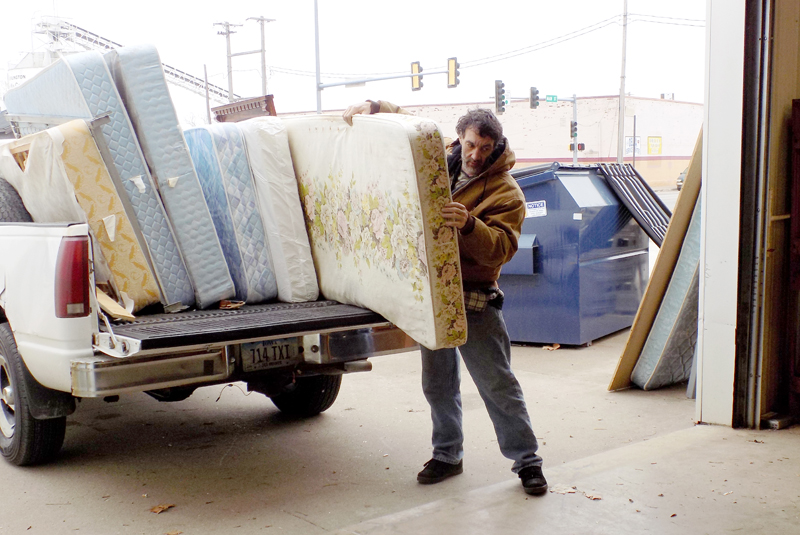By Barb Arland-Fye
The Catholic Messenger
(Editor’s Note: More than 12,000 people experienced homelessness in Iowa in 2015, according to the Institute for Community Alliances. In this article, the third in a series, The Catholic Messenger explores the issue of homelessness in the smaller towns of the Davenport Diocese.)
Craig Fenton posts on Facebook each of the developments in an enormous undertaking to purchase and renovate an old industrial building in Burlington for use as a homeless shelter.

A volunteer unloads donated mattresses at Transitions DMC in Burlington. Transitions DMC is one of several organizations in the Diocese of Davenport aimed at easing the burden of rural homelessness.
While this city of 25,663 has an existing homeless shelter, Fenton, a member of Ss. John & Paul Parish in Burlington and secretary of its St. Vincent de Paul Society, is convinced that a second shelter is needed. That’s why he and other supporters established a nonprofit organization, Transitions DMC (Divine Mercy of Christ), to open a new shelter. Sixteen of the 125 beds would provide emergency shelter while the remaining beds would give families and individuals several months to get back on their feet.
Fenton observes that the level of homelessness in smaller cities like his is difficult to pinpoint. “They’re very resourceful, skipping from couch to couch. It’s a hidden crowd. There are no tent cities here. People are tucked into little bitty crevices, old buildings that are abandoned; they’re surviving. But for the most part, it’s one of those subtle, pretty quiet topics people don’t have to talk about and don’t want to talk about.”
“We’ve only got service providers in something like 12 or 13 counties but we have homeless people coming from all 99 counties,” said Ehren Stover-Wright, research director for Institute for Community Alliances of Iowa. People experiencing homelessness tend to migrate to larger communities where services are more readily available. “There’s more of a tendency that people in rural areas will get by in doubled-up (housing) situations or marginal situations and then leave when it gets worse. You see migration to population centers.”
People become homeless for a variety of reasons, and many, for just short periods of time, Stover-Wright said. “If there’s no permanent disability, then it’s reasonable to assume people are homeless because of a lack of work or lack of affordable housing.” People experiencing homelessness are not lazy, he added. “It takes much more work to be homeless than to have a job.” His agency is seeking to get a better handle on the number of homeless in counties across the state in order to effectively coordinate services for persons experiencing homelessness or in jeopardy of becoming homeless.
The focus of Transitions DMC “is families and teens that are displaced. Those families and those kids don’t have a lot of options,” added Fenton, who estimates 200 people are experiencing homelessness in Burlington. “There are 18 teens we can identify,” he noted. “We’re not going to turn people away, if we can provide them any assistance.”
He’s hoping to open Transitions DMC by June 1, an admittedly ambitious goal considering the $250,000 that needs to be raised to cover the cost of purchasing and renovating the building and staffing it. In-kind labor and donations would reduce costs.
In the interim, Fenton and his supporters have been acquiring donated furniture and moving it to the homes and apartments of families and individuals in need. Scott McAllister, married with two young children, is grateful for the help he received from Transitions DMC and now assists the organization when he’s not job-hunting. The McAllister family was living with a relative when they learned about Transitions DMC. McAllister, 33, was unemployed and had moved his family out of Los Angeles. Transitions DMC placed the family in a hotel for a couple of weeks and “the next thing you know, we’re getting into a house — and they paid for me to get in,” McAllister said. “I never knew a group of people to have as big a heart as these people do,” he added. “I’m making a life for my family. I have a home, not a house, I have a home.”
Other families and individuals with housing needs have benefited from Transitions DMC’s help in the year since its incorporation. “We’ve helped 35 people find places,” Fenton said. “In the first three months we helped get six people off the street and they’re still in their apartments. They just needed that step up to get them going.” Altogether, Transitions DMC has provided 167 people with some sort of assistance such as funds for rent, utilities, or finding resources or a place to stay.
Most of the fundraising for Transitions DMC is being done via social media and word of mouth. Fenton believes God will provide. “We’ve had some really favorable press down here in Burlington. People are starting to know who we are. … I’m not too concerned about us failing. There are too many resources in play on a day to day basis.”
“There really is a need for people here in Burlington who fall through the cracks and need help and don’t get it,” said Father Bill Roush, parochial vicar of parishes in Des Moines County. He blessed the Transitions DMC building, located at 515 S. Main St., during an open house last summer.
An emergency stopping place in Knoxville
“People living in homelessness in small towns tend to hide. You have multiple families living in one home,” observes Chuck Galeazzi of St. Anthony Parish in Knoxville. For the past six years, he’s been coordinating an emergency shelter with eight apartments above Helping Hands Food Pantry in Knoxville, a town of 7,251 and the county seat of Marion County. “There isn’t a day that somebody doesn’t call me (for help),” he said of Helping Hands Crisis Center. “Right now, we’re sticking with women and children. But as recently as Friday, I broke my own rules; I accepted a 31-year-old homeless man who is deaf because I led with my heart. He needed it.”
At present, four of the eight apartments are filled, Galeazzi said. “I could fill them all if I wanted to.” Diocesan deacon candidate Tom Hardie helped renovate the building, along with a couple of other men, Galeazzi said. The apartments’ modest amenities include a kitchenette with electric skillets, crock pots and a microwave, but no oven. The shelter has no staff. A couple lives on site rent-free in exchange for keeping an eye on things. Volunteers also help out. “We’re giving people the opportunity to do Matthew 25:40,” Galeazzi added. Funding for the shelter comes largely from the local United Way.
One of the shelter’s guests was a job-hunting New Yorker. He traveled cross-country going from one shelter to another before stopping at Helping Hands Crisis Center. “He got a job in two days,” Galeazzi recalled. The man sent for his wife, two children and another relative. Within six weeks he’d secured an even better job in Pella and found a place to live, Galeazzi said. Women who turn to the shelter are usually waiting for city housing, he noted. “Many of these are moms who can’t afford to take a job at $12 an hour and have money left to pay child care. It’s hard for small-town America to accept homelessness. They assume that everybody can take care of themselves and get a job. If a church wanted to do something to help, they could consider free daycare for those in need.”
Homeless hospitality in Fort Madison
Joe Kowzan knows Fort Madison, population 11,043, inside out. He’s served on the city council, including as mayor, and also served on the Lee County Board of Supervisors. Today he serves as board president of the Emma Cornelis Hospitality House for persons experiencing homelessness.
“We assist around 150 men, women and children per year,” said Kowzan, a member of Holy Family Parish in Fort Madison. “We do have people from Fort Madison and from surrounding counties and people from out of state passing through.”
Not long ago, Emma Cornelis served around 200 people a year experiencing homelessness. “A lot depends on the economy and the weather and a tremendous amount of factors that cause people to end up in that situation where they are homeless and need help from someone else,” Kowzan said.
The shelter has plenty of room and hasn’t had to turn anyone away. “You don’t know who’s homeless. You can’t look at somebody and say, ‘They’re homeless.’” Someone could become homeless following separation from a spouse, after losing a job, being evicted from an apartment or because of a family squabble. Some of people who stay at the shelter are wives of prisoners at the Iowa State Penitentiary. “They may come on a weekend visit. We offer them a room and charge them $10 a night.”
Kowzan, who has been involved with the shelter for a decade, concentrates on the basics. “We provide them a warm, secure environment — a place for a meal, to do their laundry, clean themselves,” he said. “We don’t have professional staff to provide services, but we can provide them with the names of other agencies that will help them with support services.”
The shelter has one paid staffer, a house manager who lives on site. “We always have someone there 24 hours a day.”
Funding sources include St. Vincent Home Corporation of the Diocese of Davenport, United Way, Lee County Charitable Fund and private donations. Sometimes groups will donate food and clothing or other necessities needed to operate the shelter.
For those whose situation causes them to become homeless, “You want them to feel the best they can and to feel wanted in the community. You want to help them feel needed, as well,” Kowzan said. “Nobody wakes up in the morning and says, ‘I want to be homeless today.’”
How to help
Here is contact information for the organizations profiled in this week’s issue that are working with people in need of shelter.
Transitions DMC (Divine Mercy of Christ), Burlington: Craig Fenton, founder. Phone: (319) 209-2217; web page: Transitions DMC.org; Facebook: http://tinyurl.com/jk2uxd3; address: 515 S. Main St., Burlington, Iowa, 52601.
Helping Hands Crisis Center, Knoxville: Chuck Galeazzi, coordinator. Phone: (641) 842-4524. Address: 1109 E. Washington St., Knoxville, Iowa, 50138. Website is being developed.
Emma Cornelis Hospitality House, Fort Madison: Joe Kowzan, board president. Phone: (319) 372-3983. Address: 2733 Ave. N., Fort Madison, Iowa, 52627. Facebook: http://tinyurl.com/jns4hws.











